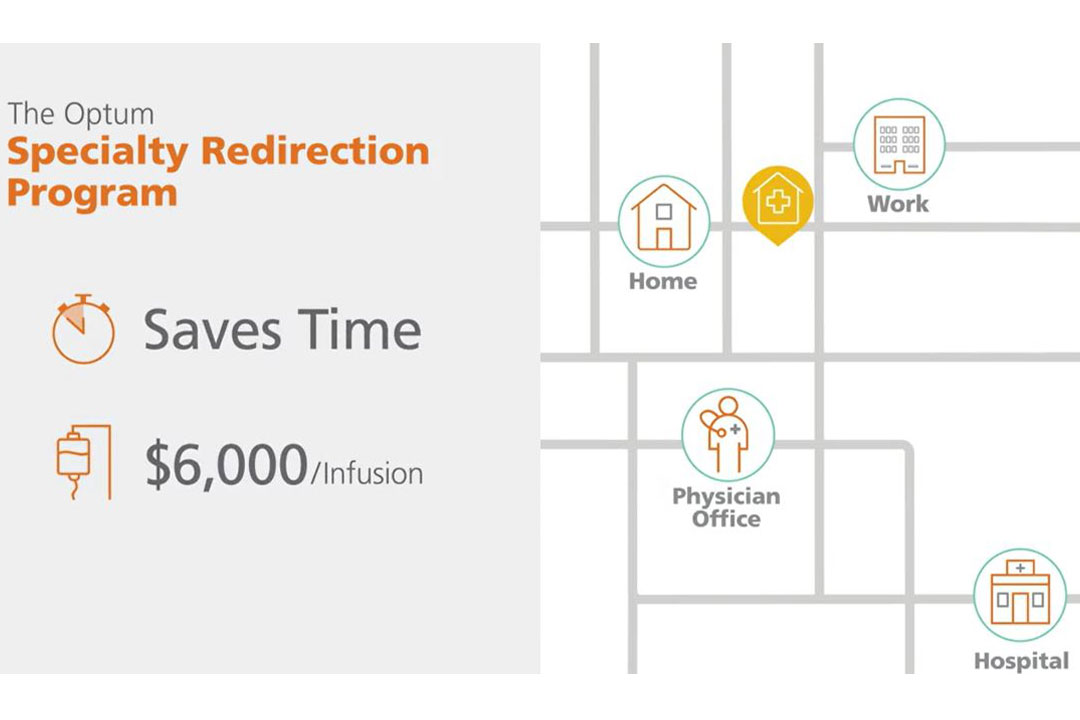Over the past decade, spending on specialty medications has risen steadily. In 2010, specialty medications accounted for 27% of total annual pharmacy spending.1 By 2020, this figure had risen to 53%.2
With this increase in spending has come a growing need for new cost management approaches to specialty medications. As a result, Optum Rx has spent years crafting innovations that break new ground addressing the root causes of rising specialty spending. Here are some of the latest.
1. An advanced analytics tool to help find savings
One unique aspect of specialty medications is that cost is spread over both the pharmacy and medical benefits. We created Specialty Compass to provide plan sponsors with new visibility and unified management capabilities across both the pharmacy and medical benefits. Specialty Compass is a client analytics platform that puts detailed, customized expertise and solutions at a client’s fingertips.
This easy-to-use tool built for the generalist can also deliver the detailed insights necessary to understand savings opportunities. Specialty Compass normalizes and aggregates medical and pharmacy specialty drug claims. It also leverages real-time analytics to provide clear areas of opportunity and precise calculations on available savings based on adoption of various solutions available in-market.
Specialty Compass takes away the need for manual synchronization of medical and pharmacy claims data. It provides users with a comprehensive, up to five-year historical view of their specialty drug spend. This holistic view enables clients to model potential savings opportunities while adjusting for different variables. These can include prescriber decisioning, site of care, or adjustments to utilization and unit costs. For example, users can isolate spending at the drug class level, examining how classes such as oncology and anti-inflammatory medications are impacting their overall spend.
2. A network approach to smoothing out cost variations
Likewise, the Optum® MedicalRx Specialty Provider Network (MSPN) represents a “clean slate” approach to addressing the rising cost of specialty care. Roughly half of specialty drugs are administered and billed under the medical benefit. However, unlike the pharmacy benefit, there has historically been a great deal of variability in how these drugs are priced.
Much of this variation is attributable to where a drug is administered. Many drugs administered in a hospital outpatient setting are billed at two times, three times or even five times cost differences compared to administration in a physician office.3
MSPN helps control these cost variations by standardizing and applying fair market-value reimbursement rates for providers within the network. Optum Rx invites infusion providers to join a national network. Network providers continue to source specialty drugs in the manner they do today to preserve their “buy and bill” revenue. However, billing will be done against the pharmacy benefit instead of the medical benefit. This new approach and contracted rate help control specialty drug spend, regardless of site of care. It also enables providers to get payments faster. They also know in real time what the prior authorization experience will be like for patients. MSPN can help plan sponsors reduce costs by up to $1.38 per member per month.4
3. A new way to protect your plan against million-dollar claims
Gene therapies are amazing scientific achievements and offer new hope to those with certain genetic diseases. However, the multi-million-dollar prices attached to some of these therapies represent an unprecedented risk to plan sponsors.
With more gene therapies entering the market, a fundamentally new approach is needed to help plan sponsors cover these milestone therapies for their members. Optum Gene Therapy Risk Protection uses an innovative risk management strategy to reduce the potential volatility presented by catastrophic claims for gene therapies. This timely solution enables plan sponsors to swap out the full cost of a potential gene therapy claim for a per member per month (PMPM) fee.
Talk to your Optum Rx representative to see if these next generation solutions are right for you and learn about other ways we are working to help make specialty medications more affordable.
Related content

A new approach to rising specialty costs

Redirecting Specialty Infusion Costs by Redirecting Site of Care

Four myths: Carving out specialty pharmacy
References:
- IQVIA. The Use of Medicines in the U.S.
- Ibid.
- National Infusion Center Association. Site of Care Optimization.
- Optum internal analysis based on 18.5 million commercial lives from Jan. 1, 2019 to Sept. 3, 2020.
STATEMENT REGARDING FINANCIAL INFLUENCE:
This article is directed solely to its intended audience about important developments affecting the pharmacy benefits business. It is not intended to promote the use of any drug mentioned in the article and neither the author nor Optum Rx has accepted any form of compensation for the preparation or distribution of this article.


